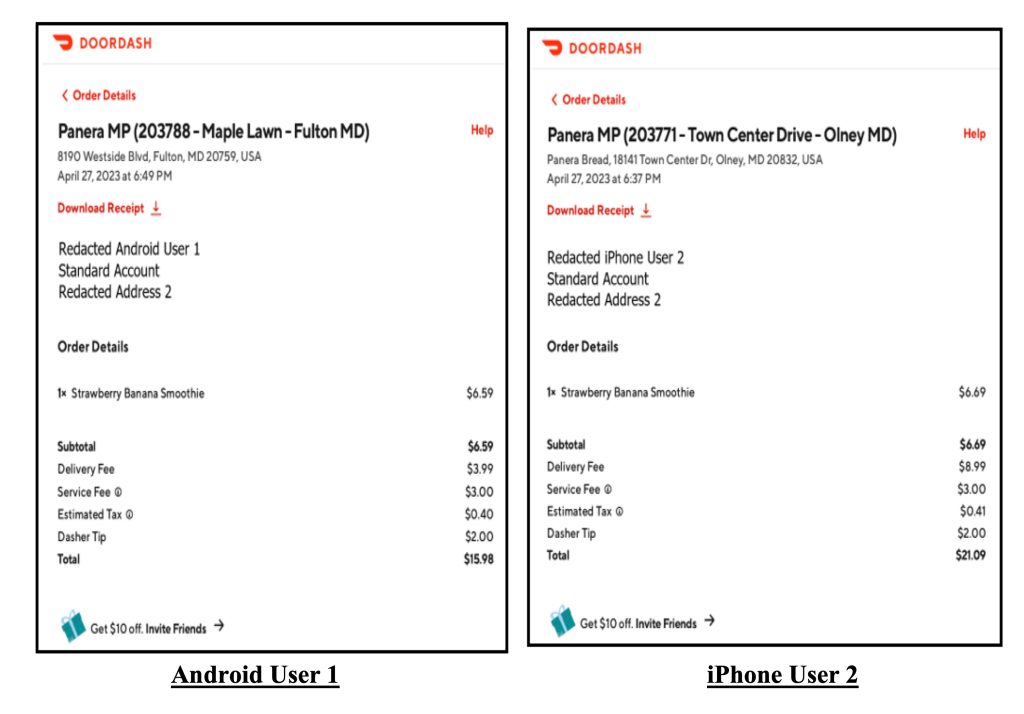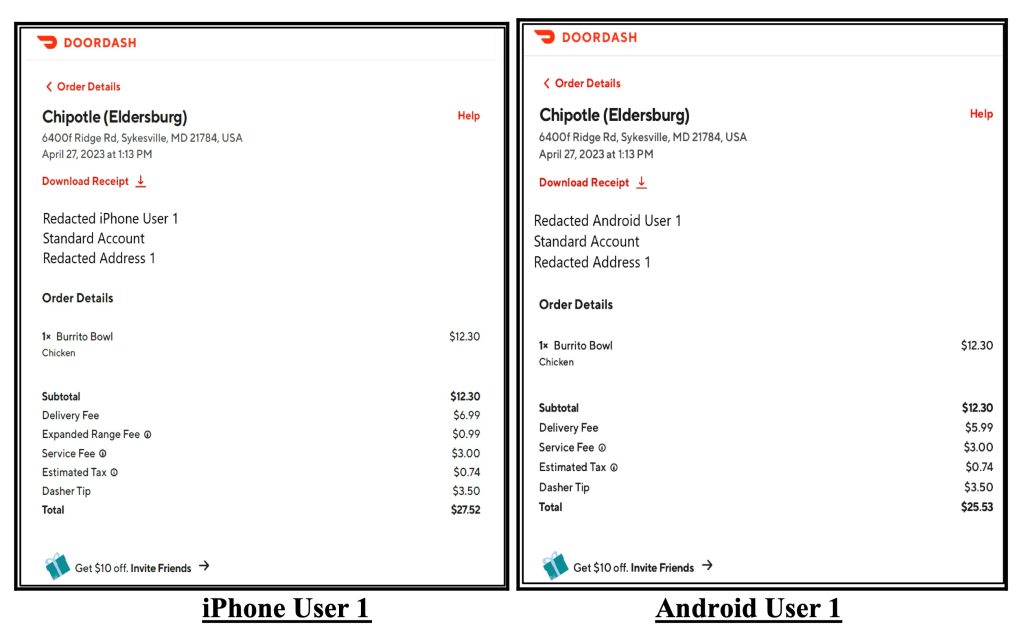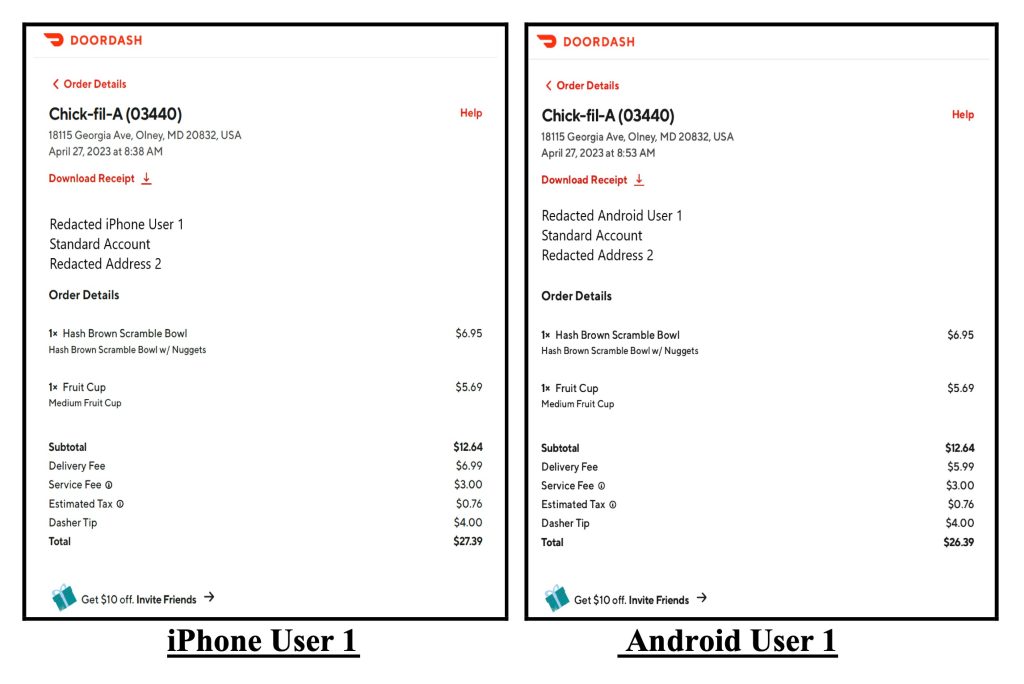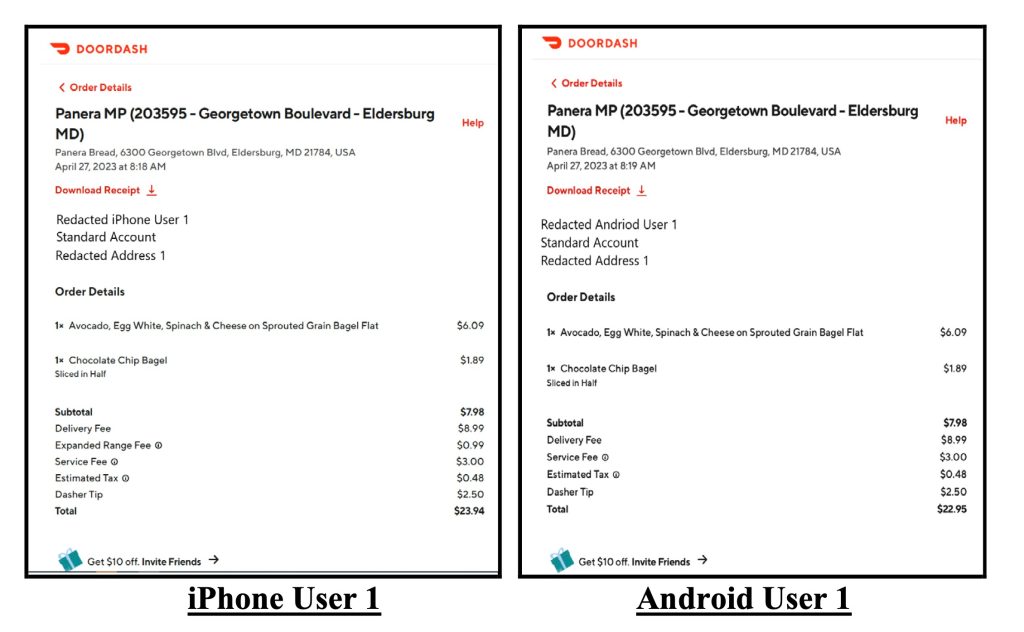DoorDash charges iPhone users more than it charges Android users, at least according to a class-action lawsuit filed against the company. In the lawsuit, customers allege that DoorDash uses vague fees “delivery charges” fees as a way to mask the higher prices being paid by iPhone users.
According to the lawsuit, DoorDash engages in a “fraudulent scheme to charge and collect misleading, premium, and hidden fees from consumers for deliveries that DoorDash does not perform and for food that DoorDash does not sell.”
DoorDash pricing on iPhone vs Android
The DoorDash customers behind the lawsuit say that the company uses an “Expanded Range Fee” as one way to target iPhone users. The fee, which isn’t listed on DoorDash’s website, has never been directly addressed by DoorDash. While the obvious assumption would be that the fee applies when a customer is far from the restaurant they’re ordering from, the lawsuit alleges that’s not the case. According to the complaint, there is no rhyme or reason as to when DoorDash charges this fee.
The lawsuit also alleges that DoorDash uses the Expanded Range Fee as a way to charge fees to DashPass users. One of the perks that DoorDash advertises for the $9.99 per month DashPass subscription, however, is $0.00 delivery fees.
“In a test on the DoorDash Platform, DoorDash applied the Expanded Range Fee to a DashPass account, but not to a standard account when each account placed the same order at the same time to the same restaurant for delivery to the same home,” the lawsuit says.

On the other hand, however, the lawsuit also says that the Expanded Range Fee is more often charged to iPhone users than Android users regardless of whether or not they subscribe to DashPass. On average, iPhone users also pay higher standard delivery fees than Android users, based on tests cited by the plaintiffs.
“DoorDash charges the expanded range fee on iPhone users more often than Android users and charges iPhone users more for ‘delivering’ (likely because studies reveal iPhone users earn more),” the lawsuit continues. “These tactics are simply money grabs.”
The lawsuit includes multiple screenshots that claim to show iPhone users and DashPass subscribers paying higher fees than Android users and non-subscribers.
As the above tests demonstrate, and upon information and belief and subject to further investigation and discovery, DoorDash routinely charges iPhone users more than Android users for reasons wholly unrelated to delivery and service costs. DoorDash likely charges iPhone users more because studies suggest that iPhone users make more money than Android users.
Under its predatory pricing scheme, DoorDash engineers its fees to reach certain revenue goals without regard to the nature of the fee that DoorDash charges consumers or how they are represented to consumers. These charging practices are abhorrent.

The lawsuit was filed by Ross Hecox and Reid Hecox in the United States District Court of Maryland last month, with the plaintiffs seeking class-action status for the lawsuit. An amended version of the lawsuit was filed in May, adding additional details about the discrepancy between what iPhone users and Android users are charged.
Over the last several weeks, the lawsuit has gone viral on TikTok, putting pressure on DoorDash to respond. In a statement to Insider, the company said the claims in the lawsuit “are baseless and simply without merit” and that fees are always fully disclosed and explained to customers.
“The claims put forward in the amended complaint are baseless and simply without merit. We ensure fees are disclosed throughout the customer experience, including on each restaurant storepage and before checkout. Building this trust is essential, and it’s why the majority of delivery orders on our platform are placed by return customers. We will continue to strive to make our platform work even better for customers, and will vigorously fight these allegations.”
The lawsuit includes a myriad of other claims, including that DoorDash’s “Express” delivery option, which costs an extra $3, has no bearing on the actual delivery time of your order. “DoorDash has no ability to provide the express service it sells for priority deliveries,” the lawsuit alleges.
Despite denying the claims, DoorDash has not yet offered any explanation for the discrepancies in pricing for iPhone and Android users revealed in the lawsuit. It also did not clarify what exactly the “Expanded Delivery Range” fee refers to.
Follow Chance: Twitter, Instagram, and Mastodon


FTC: We use income earning auto affiliate links. More.


